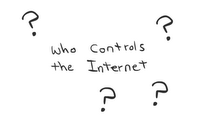« Home | Segmentation is crucial for successful strategy (B... »
Save The Internet -- Keep It Net Neutral
 We're getting a big wake up call about the Internet. It might not be "free" much longer.
We're getting a big wake up call about the Internet. It might not be "free" much longer.
All because an issue called "net neutrality" refuses to die. How does this net neutrality stuff work? Here's a good primer.
The story is pretty simple ... we're becoming a broadband nation, addicted to crackberries and high speed connections. Which means we need cable, DSL and every other pipe we can lay our digital hands on.
This gives the cable and phone companies enormous power. They are still the primary high speed connection to the internet for most of us. And, they are trying to get Congress to make a law that could let them change their high speed to low speed if money doesn't change hands.
Here's why. Right now, the cable and DSL providers let us access all sites on-line at the same speed. It's just as quick to get to Amazon as it is to Rocketboom. If the telcoms get their way, that's going to change.
Right now, the cable and DSL providers let us access all sites on-line at the same speed. It's just as quick to get to Amazon as it is to Rocketboom. If the telcoms get their way, that's going to change.
Of course, cable thinks net neutrality efforts are attempts to neuter cable's growth.
For a Tale of the Tape comparing the pros and cons of net neutrality, click here.
Congress is pushing a law that would abandon the Internet's First Amendment -- a principle called Network Neutrality that prevents companies like AT&T, Verizon and Comcast from deciding which Web sites work best for you -- based on what site pays them the most.
They will be able to slow down your connection to iTunes and speed up your connection to eBay if they want to. And, it looks like they want to. Unless someone pays them.
Sound like Tony Soprano?
Here's how it might work. If a web site doesn't pay a fee (maybe 1/4 cent per person trying to reach their site), the high speed provider slows down the speed so that you, the user, get there slower. If they pay the fee, you get there faster.
In other words, the big and rich sites get faster connections (because they can pay) and smaller, poorer sites gets shunted to the slow lane. Goodbye to the "democratic" web.
So is Net Neutrality in Danger? There's a lot of campaign contributions being funneled to members of Congress and the Senate and it seems to be clouding their thinking. All of a sudden, they think it might be a good idea to let the cable and DSL providers do whatever they want to do.
There's a lot of campaign contributions being funneled to members of Congress and the Senate and it seems to be clouding their thinking. All of a sudden, they think it might be a good idea to let the cable and DSL providers do whatever they want to do.
They pull out the tired argument that the telcos have spent so much money building an infrastructure that they should be able to make even more profit from it (as if my $40 a month high speed bill isn't enough!).
I thought Net Neutrality was a slam dunk 6 months ago when it was a hot topic in Washington - because it makes sense to keep the Web "neutral". It seemed as if Congress agreed.
I guess I was wrong.
If you want to keep the Net "neutral", it's time to get involved. E-mail your Congressman or Senator that you support net neutrality. Educate yourself about the issue.
Last month, ZDnet posted an article discussing how the Senate continued negotiations over Net neutrality, saying "key senators who are planning to overhaul the nation's communications laws remain at odds on the controversial topic of Net neutrality." Net neutrality has emerged as one of the most contentious issues as Congress attempts to rewrite the nation's telecommunications laws.
After all, a great deal of the Internet's power is in the upstarts, weirdos, creative geniuses and bored kids who keep coming up with new ways to excite, entertain, educate and shock us - even if they don't make a penny doing it.
I think we should keep it that way. Do you?
-- John Parikhal
What does Tim Berners-Lee -- inventor of the World Wide Web -- say about Net Neutrality?
Net neutrality Vs. Net neutering, click here
How can you SaveTheInternet?
posted by John Parikhal @ Sunday, July 09, 2006,
![]()
![]()















